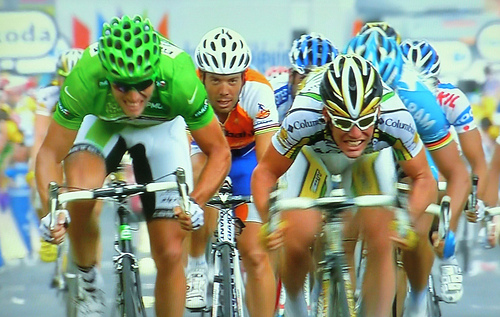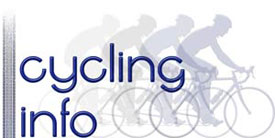I’m about to get a power meter. I’ve resisted for several years. But, nearly everyone tells me power meters are great. I feel like I’m missing out by not having one. To be honest, I’d probably prefer it they hadn’t been invented. But, they have – and so it seems a mistake to miss out on potential performance improvements for the sake of a philosophy.
With all the speculation about power and performance in this years Tour de France, it was interesting to hear in the Mark Cavendish documentary – that when he went for power tests at British Cycling and Team Telekom – both times, he was told his performance was disappointingly low. Usually, somebody with his test performance wouldn’t have been even accepted into British cycling programme or Telekom team – let alone have a whole team built around him. In Cavendish’s case the power output and numbers indicated anything but a potential world champion.

Photo: Scarlatti, Flickr
But, fortunately, power numbers are not everything, and Mark Cavendish was accepted. A big factor was simply the fact that when sprinting his small frame and low position on the bike made him more aerodynamic. Other sprinters may have more power, but they didn’t prove to be as fast when it came to the heat of the final sprint. Also, it’s not just the power you can put out when fresh. Trying sprinting after 240km, that’s the real test for a sprinter.
But, (or at least I’d like to think) sporting achievement is still about much more than raw power numbers power. The dreaded watts/ kg – power / CdA e.t.c
In Cavendish’s case, there was something else. There is that supreme will to win – the confidence, the expectation, the self-belief – the attention to detail.
His power figures may not get boffins excited. But, he had a combination of everything else to make him the most successful sprinter of the modern generation, if not all time.
I’d like to think Cavendish is still a reminder that sports physiological tests are not everything. There is still room for that something else. This appeals to the ‘romantic’ side in me, which likes to hope that sport is still about inner qualities, the desire for self-transcendence, how far can you push the limits of your body. – And not something pre-determined determined by genetics or a power meter reading tests.
Well, I will be using a power meter soon. I’ll let you know if it makes me go faster.
Related

Regarding Cavendish, it could just be that he needs the motivation of competition in order to produce the power he’s physiologically capable of. A lab test almost certainly doesn’t provide this.
I understand the advantages, but power meters leave me cold. You see training plans where riders are asked to stay at X watts for 20 minutes and then Y watts for 10 minutes which surely means you’re spending your whole time on the bike staring at a small screen. Again, motivation comes into it here. How do you motivate yourself to go out for training rides like that?